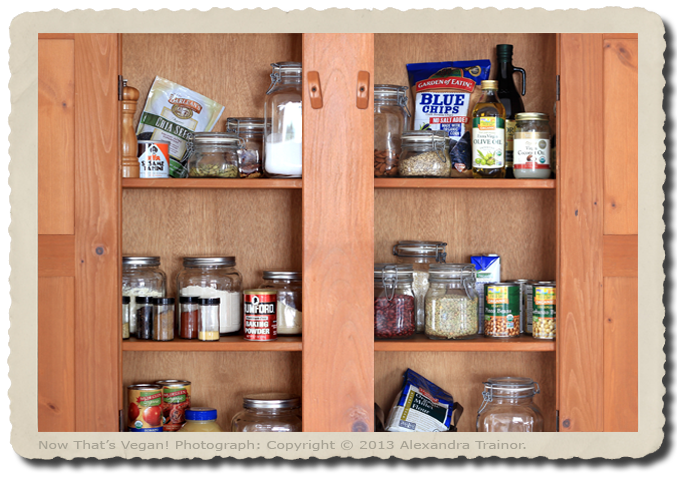If you’re wondering what foods to keep in your vegan and gluten-free pantry, take a look at what we keep in ours — here at Now That’s Vegan! Basically, we try to have on hand what is needed for the recipes that we plan to make in the coming days, weeks, or even months, depending on the length of their shelf life.

In General, we like to have in our pantry dried beans, lentils and split peas, vinegar, natural sweeteners, pastas and grains, seeds, nuts and nut butters, canned tomatoes, vegetables stocks, baking supplies, dried herbs, and spices. You’ll find that stocking up on these non-perishable foods when there’s a sale can save you money. Perishable foods, on the other hand, should be purchased fresh, refrigerated, and used quickly. Meat, poultry, fish, cottage cheese and cows milk are perishable food that vegans don’t eat. However, vegans do eat other perishable foods, such as fruits, berries, garlic, and onions — just to name a few. Even when stored properly in the refrigerator, perishable foods can go bad from within a few days to a couple of weeks, depending on the food. So basically, the idea is to store what you can and have everything else be as fresh as possible.
Perishables
Most perishable foods need refrigerating. And, though oil doesn’t need to be refrigerated, and stays fresh longer than most refrigerated foods, its shelf life is still relatively short, making it a perishable food.
- Berries, such as bluebrries, rasberries, strawberries…
- Fresh herbs, such as basil, cilantro, mint, parsley, thyme, rosemary, sage…
- Fruits and vegetables, such as asparagus, apples, avocado, bananas, beets, broccoli, brussel sprouts, carrots, cauliflower, celery, collard greens, cucumbers, dates, garlic, green beans, kale, lemons, lettuce, limes, olives, onions, parsnips, peaches, pears, peas, peppers, pineapple, pumpkin, radishes, spinach, squash, sweet potato, tomatoes, turnips, zucchini…
- Oils, such as extra virgin coconut oil, extra virgin olive oil, grape seed oil, toasted sesame oil…
Non-perishables
Non-perishable foods don’t need refrigeration. Yet, many do well to be refrigerated after opening. Don’t keep anything that has passed its expiration date.
- Aluminum free baking powder
- Applesauce, unsweetened
- Arrowroot powder
- Bakers yeast
- Baking soda
- Brown rice
- Brown rice syrup
- Canned beans, such as black beans, chick peas…
- Canned goods, such as artichokes, black olives, corn kernels, diced tomatoes, tomato puree, tomato paste, whole tomatoes, unsweetened coconut milk…
- Capers
- Carob powder or cacao powder, and cacao nibs
- Dried beans, such as black eyed peas, lentils, red kidney beans…
- Dried chiles
- Dried fruits, such as dried cranberries, raisins…
- Dried sea vegetables
- Dried split peas
- Egg replacement powder
- Gluten-free crackers
- Gluten-free flours and starches, such as almond flour, amaranth flour, arrowroot flour, brown rice flour, buckwheat flour, corn flour, cornstarch, millet flour, Oat flour, potato flour, quinoa flour, sorghum flour, sweet rice flour, tapioca flour, white rice flour…
- Gluten-free grains and cereals, such as amaranth, barley, buckwheat, millet, rice, rolled oats, sorghum and more
- Gluten-free dried pastas and noodles, such as ones made form bean, rice, or quinoa.
- Gluten-free tamari
- Gluten-free wasabi
- Low sodium vegetable broth
- Maple syrup
- Mustard
- Nondairy milks, such as almond milk, rice milk…
- Nutritional yeast
- Nuts and seeds, such as almonds, cashews, chia seeds, flax seeds, hemp seeds, pine nuts, quinoa, sunflower seeds, macadamia nuts, pecans, walnuts…
- Pure vanilla extract
- Rice, such as brown, wild…
- Shredded coconut
- Sun-dried tomatoes
- Sweeteners, such as agave nectar, dates, pure maple syrup, molasses, stevia…
- Tahini
- Thai red curry paste
- Vegan carob chips
- Vegan mayonnaise
- Vinegars, such as apple cider vinegar, balsamic vinegar, white wine vinegar…
Dried Herbs and Spices
Unlike fresh herbs that need refrigeration, dried herbs and spices last a long time without need of refrigeration.
- Allspice
- Basil
- Bay leaves
- Black peppercorns, whole and ground
- Caraway, seeds or powder
- Cardamom pods
- Cayenne
- Celery seed
- Chili powder
- Cilantro
- Cinnamon, sticks or powder
- Cloves, whole and ground
- Coriander, seeds or powder
- Curry masala
- Cream of tartar
- Cumin
- Curry powder
- Dill
- Garlic powder
- Garam masala
- Ginger powder
- Green cardamom
- Herbs de Provence
- Marjoram
- Mustard, seeds or powder
- Nutmeg
- Onion powder
- Oregano
- Paprika
- Parsley
- Red pepper flakes
- Rosemary
- Saffron
- Sage
- Salt, preferably Celtic sea salt or Himalayan salt
- Tarragon
- Turmeric
- Thyme
Staying Healthy
When shopping, read labels. Purchase Certified Organic and Non-GMO foods when possible, avoid refined sugar, and look for products that are certified gluten- free and free of animal products. Read carefully, because what may seem okay might not be good for you. Some carob chips, for example, may contain dairy products. Oats that are not gluten-free certified may be contaminated with gluten. Some vinegars contain gluten, typically in the form of malt. Even the above list of Pantry Essentials isn’t suitable for everyone. You may be allergic to nuts, for example. Just subtract from the the list what isn’t right for you.
Consult Your Doctor
Always consult your physician before changing your diet or beginning any exercise program. The information shared in this website is not intended to diagnose any medical condition or to replace your physician’s advice. If you experience any health problems on the diet that this website promotes, discontinue the diet and consult your physician.
Kitchen Smart
Besides having an equipped pantry, you will need some kitchen tools. Visit our Kitchen Smart page for a list of useful kitchen gadgets and small appliances — all to make preparing food a little easier.


Recent Comments